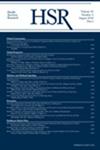To investigate women's perceptions of telemedicine for reproductive health care services, focusing on how perceived benefits and privacy risks influence their intentions to adopt telemedicine and their willingness to disclose personal health information.
A cross-sectional survey was conducted. The study applied the privacy calculus theory to the context of telemedicine for reproductive health, using adapted, validated variables to develop the survey. Outcome variables included intentions to adopt telemedicine and willingness to disclose accurate personal health information.
Data were collected in May and June 2023 using Qualtrics online panel services, targeting women across the United States who had not used telemedicine for reproductive health. The sample comprised 847 women aged 18 and older. Structural equation modeling was employed using AMOS v28.0 to test the hypothesized relationships between perceived benefits, perceived risks, and adoption intentions. The analysis controlled for age, household income, political affiliation, religious views, and prior births.
Perceived benefits were positively related to intention to adopt telemedicine for reproductive care (β: 0.600, p < 0.001), and willingness to disclose accurate personal health information (β: 0.453, p < 0.001). Unexpectedly, perceived privacy risks were positively related to adoption intentions (β: 0.128, p < 0.001), but negatively related to willingness to disclose (β: −0.282, p < 0.001). Intentions to adopt were positively associated with willingness to disclose (β: 0.089, p < 0.05). Lastly, older women and women located in states with abortion restrictions expressed lower intentions to adopt. The model explained 40.2% of variance in intention to adopt and 38.3% of variance in willingness to disclose.
The study demonstrates the importance of perceived benefits and privacy risks in driving telemedicine adoption and disclosure intentions among women in the reproductive health context. These findings suggest the need for targeted strategies to address privacy concerns and support telemedicine adoption, particularly in restrictive regulatory environments.


